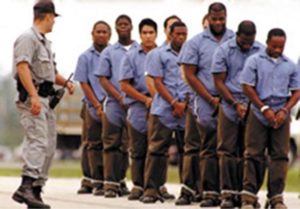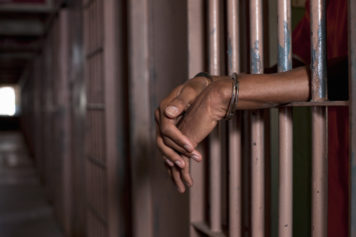With roughly a year and a half remaining in his administration, President Obama has decided to take up the issue of criminal justice reform by visiting a federal prison and commuting the sentences of dozens of nonviolent drug offenders. The issue is timely, given that the war on drugs and “tough on crime” sentencing schemes have left the U.S. with the largest prison population in the world and little to show for it. Particularly, Black communities—the president’s base—have been irreparably damaged, with families separated from their loved ones, and children growing up without their parents.
While there is a sense that these initiatives are a good first step, and better than nothing at all, much more must be done, and a great deal more is being left on the table.
Obama recently announced his decision to visit El Reno federal prison in Oklahoma— a medium security facility housing 1,300 inmates—marking the first visit by a sitting U.S. president to a federal institution. Obama will tour the facility with Shane Smith, the founder of VICE, and the visit with prisoners, staff and officials will be made into an HBO documentary airing in the fall.
“There’s an emerging consensus in this country—on both the right and the left—that the way we treat criminal offenders is utterly broken and weakening our society in profound ways,” Smith said. “Visiting El Reno with President Obama—the first-ever visit to a federal prison by a sitting president—will give our viewers a firsthand look into how the president is thinking about this problem, from the policy level down to one on one conversations with the men and women living this reality. It’s going to be fascinating.”
“I am really interested in the possibilities, the prospect of bipartisan legislation around the criminal justice system,” the president told reporters recently. “And we’ve seen some really interesting leadership from some unlikely Republican legislators very sincerely concerned about making progress there.”
In conjunction with the prison visit, President Obama is commuting the sentences of over 46 nonviolent drug offenders in the coming weeks (14 of whom had life sentences), a move designed to underscore the president’s commitment to criminal justice reform.
“These men and women were not hardened criminals,” Obama said in a video posted on the White House Facebook page. “Their punishments didn’t fit the crime.”
As the Boston Globe reported, the move has brought Obama’s total commutations to 89, more than any president since Lyndon B. Johnson, who commuted 226 sentences during his time as president. Further, Obama has now commuted more sentences than the last four chief executives combined.
However, thoughtful critics suggest that far more is necessary. For example, writing for Your Black World, Dr. Boyce Watkins suggests that while doing a little is better than doing nothing at all, it is not the same as doing what is necessary.
“The fact remains that the War on Drugs led to the incarceration of tens of thousands of Americans, many of whom still languish in prison cells for petty drug crimes committed many years ago,” Watkins said. “To use the old fashioned model of commutation to solve this 21st century holocaust is like cleaning up a Chicago snow storm with a teaspoon.”
Writing for Yahoo News, Michael Isikoff suggests President Obama is the Scrooge of pardons, overly reluctant to use his power due to a “determination to avoid controversies” of the type experienced by Bill Clinton. Isikoff reports that Obama has issued 64 pardons (not to be confused with commutations), fewer than any president since Garfield. The pardons Obama has issued have been, according to critics, “largely trivial, and missed opportunities to correct past injustices or excesses in the criminal justice system.”
A case in point is Sala Udin, a former civil rights Freedom Rider who has asked Obama for a pardon. In 1970, Udin was convicted on interstate firearm charges for keeping an unloaded rifle in his car, and served eight months in federal prison. The Student Nonviolent Coordinating Committee activist was on his way from Mississippi, and used the rifle as protection from the Ku Klux Klan.
Meanwhile, in addition to the president’s recent actions, the U.S. Sentencing Commission has changed the guidelines for drug offenders, resulting in retroactive sentence reductions for over 9,500 people, three-fourths of them people of color. Further, lawmakers and policy advocates, liberal and conservative alike, are pushing for criminal justice reforms as the crime rate has fallen dramatically in recent decades.
Reuters reports that several bills with bipartisan sponsorship are waiting in Congress, but have stalled due to inaction and the resistance from older, “tough on crime” lawmakers. For example, the Smarter Sentencing Act, sponsored by Tea Party Senator Mike Lee and Democrat Richard Durbin, would abolish mandatory minimum sentences for drug offenders. The Corrections Act would allow some prisoners to reduce their sentences by a quarter through jobs and other programs in prison. In addition, the SAFE Justice Act would relegate mandatory minimum sentences to drug kingpins, and allow prisoners to earn reduced sentences by participating in programs while incarcerated.
The war on drugs has been years in the making, and has been a bipartisan effort, so perhaps it is unrealistic to believe that the actions of one president can undo the damage of American mass incarceration. Yet, with eighteen months left in his presidency, Obama still has much time to right some of these wrongs.



